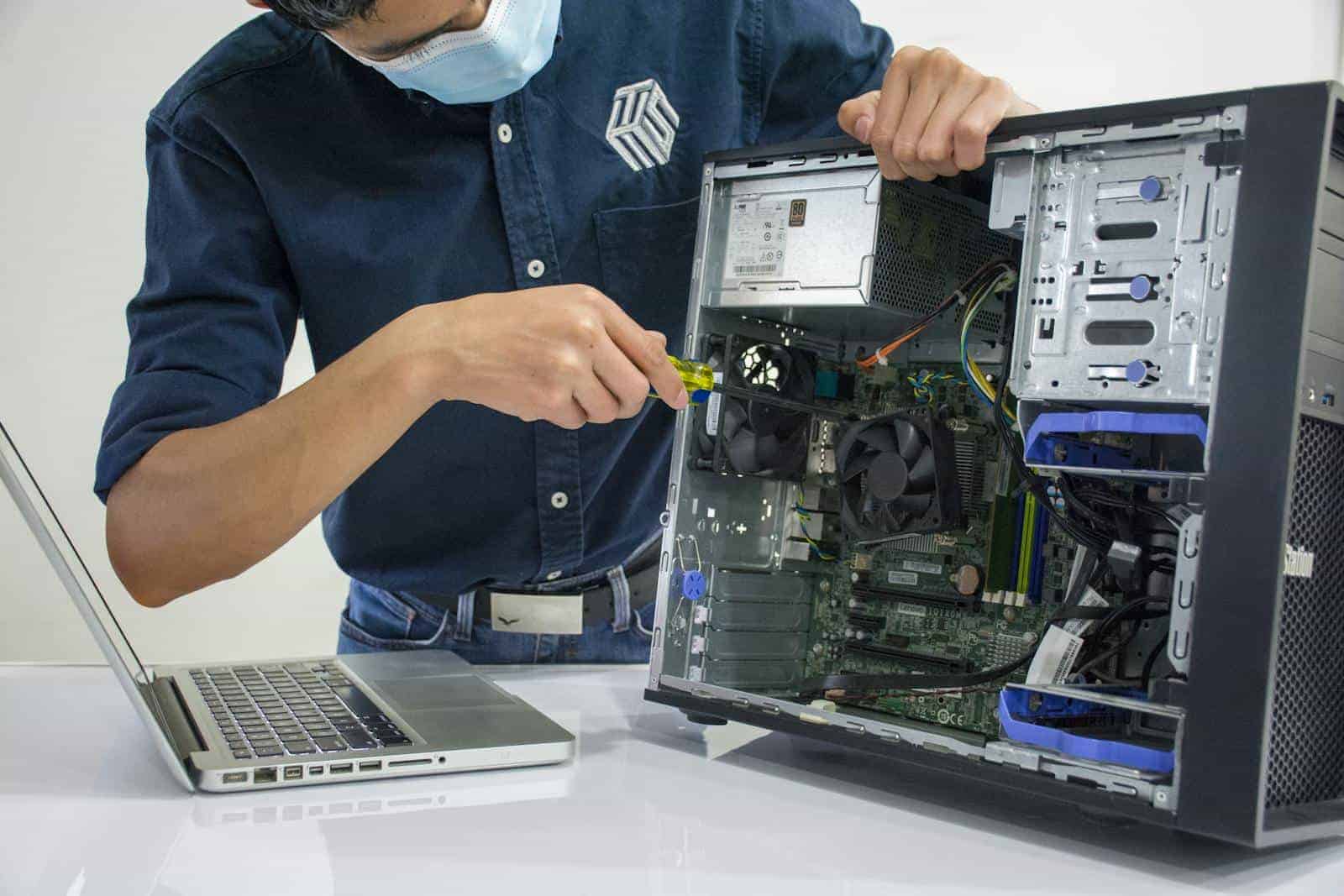Starting a computer repair business can be an attractive opportunity for those with a knack for technology and problem-solving. This venture can cater to a broad audience, as nearly everyone uses computers and tech devices that may require repairs and maintenance. Before diving into the computer repair industry, it is critical to assess the startup costs. Such costs can vary depending on whether one chooses to operate from a physical location or on a freelance, in-home basis.
Initial investments typically include the procurement of tools, software for diagnostics, and spare components essential for the repair work. Establishing a solid business strategy is fundamental to the success of a computer repair business. Prospective business owners should define their target customers, types of services offered, competitive pricing models, and effective marketing tactics to promote their services.
Warranty offerings and fostering strong customer service can also be significant in creating a trusted brand. Once the framework of the service is in place, focus shifts to the operational aspects, such as securing a workspace, obtaining business insurance, and keeping pace with the evolving tech world to ensure relevant and efficient repair services.
Building Your Tech Empire: A Guide to Starting a Computer Repair Business
Turning your tech skills into a profitable venture can be rewarding. However, starting a computer repair business requires careful planning and execution. Here’s a roadmap to guide you on this journey.
Key Steps
| Step | Description |
|---|---|
| Market Research and Business Plan | Analyze your local market, identify target customers, and define your service offerings. Create a comprehensive business plan outlining your goals, financial projections, and marketing strategies. |
| Legal and Financial Setup | Choose a suitable business structure (sole proprietorship, LLC, etc.), register your business, and obtain necessary licenses and permits. Set up a business bank account and explore funding options if needed. |
| Workspace and Equipment | Decide on a location (home-based or storefront) and acquire essential tools and equipment for repairs and diagnostics. |
| Technical Skills and Certifications | Ensure you have the necessary technical expertise and consider obtaining certifications to enhance your credibility and attract customers. |
| Pricing and Services | Develop a clear pricing structure for your services, considering factors like labor, parts, and market competition. |
| Marketing and Branding | Create a strong brand identity, develop a website and social media presence, and implement effective marketing strategies to reach your target audience. |
| Customer Service and Support | Provide excellent customer service, build relationships with clients, and offer reliable support to ensure customer satisfaction and repeat business. |
Essential Tips
- Stay updated: The tech industry evolves rapidly, so continuous learning is essential to stay ahead of the curve and offer the latest solutions.
- Build a network: Connect with other professionals in the industry, suppliers, and potential partners to expand your reach and knowledge.
- Invest in insurance: Protect your business with appropriate insurance coverage, such as general liability and professional liability insurance.
- Focus on customer satisfaction: Deliver high-quality service, communicate effectively, and exceed customer expectations to build a loyal client base.
- Adapt and evolve: Be flexible and willing to adapt your business strategies to meet changing market demands and customer needs.
Starting a computer repair business requires more than just technical expertise. It demands a blend of business acumen, strategic planning, and a passion for technology. By following this guide and remaining adaptable, you can turn your passion for fixing computers into a successful and fulfilling entrepreneurial journey.
Starting A Computer Repair Business

| Step | Description | Important Considerations |
|---|---|---|
| Build your skills | Ensure you have strong technical abilities in hardware repair, software troubleshooting, virus removal, and data recovery. | Consider certifications like CompTIA A+ to boost your credibility. |
| Develop a business plan | Outline your business goals, target market, services offered, pricing strategy, and marketing plan. | Your business plan is crucial for attracting investors or securing funding. |
| Choose a business structure | Decide whether to operate as a sole proprietor, LLC, or another legal entity. | Consider factors like personal liability, tax implications, and how you plan to grow your business. |
| Obtain licenses and permits | Research your local and state requirements for business licenses and permits. | Operating without the necessary permits can lead to fines. |
| Get insured | Protect your business with liability insurance and equipment insurance. | This safeguards you against customer disputes and accidental damage. |
| Set up your workspace | Whether you’re working from home or renting a storefront, you’ll need a clean, organized workspace with the necessary tools. | Invest in quality diagnostic tools, repair equipment, and a system for organizing parts. |
| Market your services | Develop a marketing strategy that may include a website, social media presence, networking, or local advertising. | Focus on reaching your target customers effectively. |
| Price your services | Set competitive rates that are profitable while considering your experience level and local market. | Offer different service packages and hourly rates for flexibility. |
| Provide excellent customer service | Build a reputation for being reliable, knowledgeable, and helpful. | Word-of-mouth referrals are essential in the computer repair business. |
Additional Tips:
- Start small: Begin with a manageable workload as you build your business.
- Specialize: Consider focusing on a niche like Apple repairs or data recovery.
- Network: Connect with other tech professionals, and potentially partner with local businesses.
Key Takeaways
- Careful consideration of startup costs is necessary to begin a computer repair business.
- A well-crafted business strategy is crucial for setting a clear direction and achieving success.
- Operational efficiency and staying updated with technology trends are important for long-term growth.
Developing Your Business Strategy
A well-crafted business strategy serves as the roadmap for establishing a successful computer repair business. It lays out a detailed plan, considers the legal structure, analyzes the market, and sets up efficient operations.
Creating a Business Plan
Business Plan: This document will guide your journey. It should include:
- Executive Summary: Briefly outlines your business goals.
- Company Description: Provides detailed information about what your business does.
- Market Analysis: Evaluates the need for computer repair services in your area.
- Organization and Management: Describes your business’s structure.
- Service Offerings: Details the types of repairs you will offer.
- Marketing and Sales: Covers how you will attract and retain customers.
- Funding Request: If you need financial support, specify the amount and its use.
- Financial Projections: Offers a forecast of your business’s financial health.
Remember to pick a business name that’s clear, catchy, and gives an idea of your services.
Choosing a Business Structure
Decide on the legal structure as it affects taxes, liability, and paperwork. Common options:
- Sole Proprietorship: Simple, ideal for starting alone.
- Partnership: If you’re starting with someone else.
- Limited Liability Company (LLC): Limits personal liability.
- Corporation: More complex, beneficial for larger setups.
Each structure has different requirements for licenses and permits, so check local laws.
Conducting Market Research
Market research identifies who needs your services and what other businesses offer. Conducting a competitive analysis helps you find your niche, separate from the competition. Understand your target customer and design a marketing strategy to reach them. You could focus on specific services, like data recovery or mobile device repair, to stand out.
Setting Up Your Business Operations
Deciding on a location involves balancing cost with visibility and convenience for customers. Home-based can save money, but a storefront increases visibility. Once you find a spot, obtain necessary permits and insurance to protect your business. Set your pricing by considering costs, market rates, and desired profit margins. Highlight your expertise and certifications in your marketing to build trust with potential customers.
Operating procedures, customer service policies, and a reliable system for managing appointments and records are the backbone of your daily operations. Make sure they’re in place from the start.
Launching Your Operations
Starting a computer repair business involves more than just technical know-how. It requires careful planning and a systematic approach to manage resources effectively and to ensure the business runs smoothly from day one.
Securing Funds and Managing Finances
A critical first step in launching your computer repair business is to secure funding. Options include dipping into personal savings or obtaining an SBA loan. With funding in hand, set up a business bank account to manage revenues and expenses. It’s important to keep personal and business finances separate for clear bookkeeping.
- Funding Sources:
- Personal savings
- SBA loan
- Investors
- Financial Management:
- Business bank account setup
- Accurate bookkeeping
- Clear separation of personal and business finances
Obtaining Necessary Tools and Equipment
Your business’s ability to diagnose and fix computer issues depends on having the right tools and equipment. Invest in quality hardware and software, and establish relationships with reliable suppliers to maintain an inventory of necessary parts. Regularly assess and update your equipment to stay current with technology trends.
- Essential Equipment:
- Diagnostic software
- Repair tools
- Replacement parts inventory
- Supplier Relationships:
- Hardware
- Software
- Inventory management

Building a Strong Online Presence
In today’s marketplace, a robust online presence is vital for attracting customers. Develop a professional website and engage with potential customers through social media platforms like Facebook. Consistently post relevant content to establish expertise and build trust with your audience.
- Online Assets:
- Website design and development
- Social media profiles on platforms like Facebook
- Content Creation:
- Regular posting schedule
- Relevant and helpful information for customers
Implementing Effective Marketing Tactics
Marketing is essential for attracting customers and generating sales. Implement tactics that target your local area and the specific services you offer. Monitor the success of different strategies and adjust your approach to find the most effective methods for your business.
- Marketing Strategies:
- Local area targeting
- Service-specific advertising
- Performance Tracking:
- Strategy success monitoring
- Marketing adjustment for effectiveness
Providing Stellar Customer Service
Superior customer service sets you apart from competitors and helps build a positive reputation. Train staff to handle inquiries efficiently and solve customer issues with empathy. Encourage satisfied customers to leave reviews which can influence new customers seeking reliable repair services.
- Customer Interaction:
- Efficient inquiry handling
- Empathetic problem resolution
- Reputation Management:
- Positive customer reviews
- Service quality as a priority
Managing Growth and Scaling Your Business
As your computer repair business develops, managing growth becomes a priority. Focus on maintaining service quality while expanding. Consider hiring additional staff and expanding services only when stable profits indicate it is safe to do so.
- Growth Milestones:
- Stable profits
- Quality maintenance
- Expansion Consideration:
- Staff hiring
- Service range increase
Frequently Asked Questions
When launching a computer repair business, you may have several questions about the initial steps, necessary tools, qualifications, profitability, startup costs, and business planning. Below are answers to some common inquiries.
What initial steps should I take to establish a home-based computer repair business?
Start by selecting a business name that is both meaningful and memorable. Then proceed to register your business, acquire any necessary licenses, and set up a dedicated work area equipped with the needed tools and technologies.
What essential tools are required to begin offering computer repair services?
You will need a variety of tools to perform computer repairs effectively. These include screwdrivers, antistatic wristbands, USB network adapters, cable testers, and diagnostic software. A reliable multimeter and soldering iron may also be necessary for more complex jobs.
Are there any specific qualifications necessary to operate a computer repair business?
While formal qualifications are not always mandatory, having certifications from recognized programs like CompTIA A+ or Microsoft Certified IT Professional can provide credibility. Continuous learning and staying current with technology are also crucial.
Can a computer repair business be profitable and how can I maximize earnings?
A computer repair business can be profitable with a solid client base and effective service pricing. Maximize earnings by offering competitive rates, delivering quality services, and perhaps retailing computer parts or offering additional IT services.
What are the potential startup costs involved in opening a computer repair shop?
Startup costs can vary widely. They can include expenses for licenses, tools, equipment, insurance, marketing, and possibly leasing a space if not operating from home. Initial investment can range from a few thousand dollars to much higher, depending on the scale.
How can I create an effective business plan for my computer repair venture?
An effective business plan should outline your market research, services offered, pricing strategy, competitive analysis, marketing, financial projections, and operational plan. This document should serve as a roadmap for establishing and growing your business.







